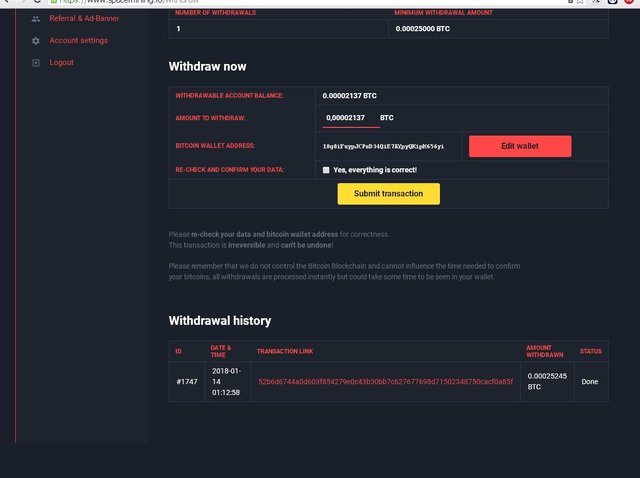Bitcoin's ethereum killer-rsk.co

Bitcoin can do smartcontracts! But without the high fees of bitcoins! Say what? How can that be?
Bitcoin can run smart contract/be an assets creator with the use of a sidechain. A sidechain is separate chain that connect with bitcoin's main chain. Thus allowing bitcoin to have an ethereum like system without clogging up the main chain. That rsk.co for you :)
Rsk.co use bitcoin as its currency like how eth use eth as in system currency.
Here how it works:
RSK is a smart contract platform that adds a Turing Complete Virtual Machine — a “world computer” — to Bitcoin. Additionally, RSK achieves 100-300 transactions per second on chain and confirms most payments in less than 20 seconds, while leveraging Bitcoin's proof of work security(merged mining).
But with the Lumino Transaction Compression Protocol (LTCP), RSK will be able to process up to 2000 tps on chain! And once the Lumino Network is deployed over RSK, it will allow up to 20k tps off-chain taking Bitcoin to Visa processing levels.
RSK is a Bitcoin Sidechain — a separate blockchain that carries a "separate token" but is able to exchange tokens back and forth with the main Bitcoin blockchain. Users can move bitcoin to the RSK chain, make use of the converted bitcoin, and then eventually move their tokens back, as bitcoin, to the main blockchain by a 2waypeg(aka making decentralized bitcoin backed tokens) . Summing this paragraph off-rsk.co uses a decentralized process to create bitcoin backed tokens
Here how they peg bitcoin to smart bitcoin. Remember 1 smart bitcoin=1 bitcoin
The 2-Way peg is often said to be a method to transfer BTC into SBTC and vice-versa. In practice, when BTC are exchanged for SBTC, no currency is “transferred” between blockchains. There is no single transaction that does the job. This is because Bitcoin cannot verify the authenticity of balances on another blockchain. When a user intends to convert BTC to SBTC, some BTC are locked in Bitcoin and the same amount of SBTC is unlocked in RSK. When SBTC needs to be converted back into BTC, the SBTC get locked again in RSK and the same amount of BTC are unlocked in the Bitcoin blockchain. A security protocol ensures that the same Bitcoins cannot be unlocked on both blockchains at the same time.
Here how the peg works:
When a Bitcoin user wants to use the 2-Way Peg, he sends a transaction to a multisig wallet whose funds are secured by the Federation. The same public key associated with the source bitcoins in this transaction is used on the RSK chain to store the Smart Bitcoins. This means that the private key that controlled the Bitcoins in the Bitcoin blockchain can be used to control an account on the RSK chain. Although both public and private keys are similar, each blockchain encodes the address in a different format. This means that the addresses on both blockchains are different.
The big problem with side chains right now is it kinda somewhat centralized aka remember me stating the federation?
Do not worry it only temporary!!!!
The RSK platform will be launched with a Federation of well-known and respected community members (blockchain companies with high security standards). Each member is identified by a public key for the block checkpoint signature scheme. The Federation is able to add or remove members using an on-chain voting system. The conditions to become a Federation member (known as Federation Member Requirements or FMR) establish basic security policies and legal requirements that all members must meet.
The Federation will provide several services to the network. Some of them will be available at launch and other will be added later. Each member can choose to provide any of the following services:
Two-way peg with Bitcoin
Checkpointing services
However when Core( i think they will Blockstream is supporting side chains)adds special opcodes or extensibility to validate SPV proofs as a hard-fork, or to manage a drivechain, the Federation role as STTPs in the 2-Way peg will no longer be necessary. Until that happens, we expect the Federation and the sidechain validation to coexist.
And the for the checkpoints
By default, clients stop using federated checkpoints when if RSK hashing power is over 66% of the maximum BTC hashing difficulty observed in the best chain and the fees paid in a block are higher or equal to the average reward of a Bitcoin block. However, any user can re-configure this local policy.
So pretty much for rsk to be decentralized it must have 70% of bitcoin hashpower(luckily 90% has agreed to merge mine it so that part is out of the way) and core adding the protocol for sidechains then the federation will be deactivated
Another very very small "flaw" is that the Lumino Transaction Compression Protocol compresses the data so much it has a small very small 1 out of a million chance to expose identity which is bad for those concerned about privacy. However with a quick sap of adding zk-Snarks the privacy should be completely solved.
This is the future my friends! Rsk.co can scale even further with future scaling solutions.
- Rsk.co is a real product with a beta main net not a hype product.
Some info came from the official site: https://faq.rsk.co/
Also see how bitcoin can scale without big blocks
https://steemit.com/bitcoin/@sames/bitcoin-newest-scaling-method-adding-bech32-plus-others
@OriginalWorks
Info also found here: https://cointelegraph.com/news/bitcoin-scalability-issue-takes-new-turn-as-rsk-ready-to-release-ginger
The @OriginalWorks bot has upvoted and checked this post!
Some similarity seems to be present here:
https://faq.rsk.co/
This is an early BETA version. If you cited this source, then ignore this message! Reply if you feel this is an error.
@sames payed 1.039 SBD to @minnowbooster to buy a stealth upvote.

transaction-id faff55116e558d02e3f024988234976537b27149
@stealthgoat
A lot of people are only paying attention to the lightning Network as a scaling option and some even complain about the need to close a channel. RootStock doesn't suffer from this issue and can also scale. I assume we will see LN + RootStock Gateways too.
You don't need to close a channel in theory if LN truly gets mass adopted. Bitcoins would just stay on the LN.
https://www.spacemining.io/?ref=30523 new site 100 GH/s for start on mining Bitcoin proof payment 100% im testing from myself